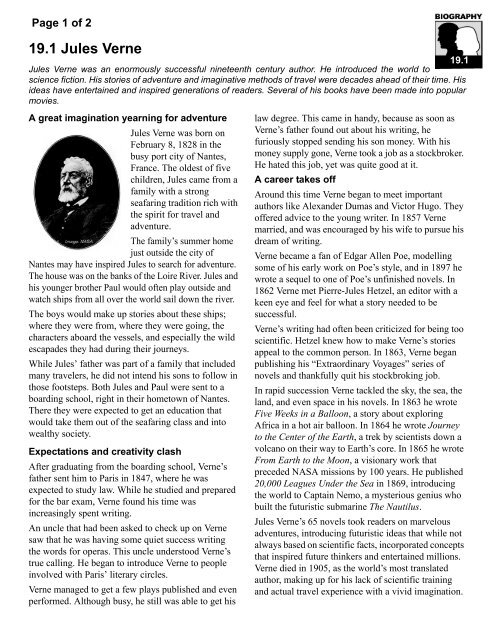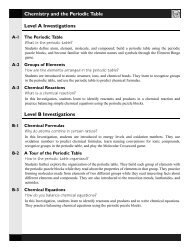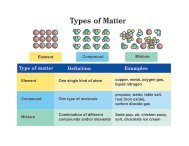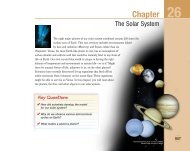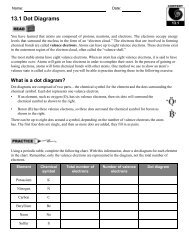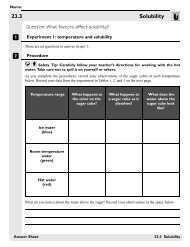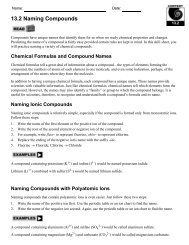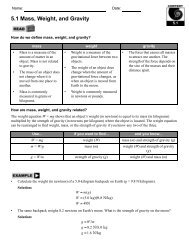19.1 Jules Verne - CPO Science
19.1 Jules Verne - CPO Science
19.1 Jules Verne - CPO Science
You also want an ePaper? Increase the reach of your titles
YUMPU automatically turns print PDFs into web optimized ePapers that Google loves.
Page 1 of 2<strong>19.1</strong> <strong>Jules</strong> <strong>Verne</strong><strong>19.1</strong><strong>Jules</strong> <strong>Verne</strong> was an enormously successful nineteenth century author. He introduced the world toscience fiction. His stories of adventure and imaginative methods of travel were decades ahead of their time. Hisideas have entertained and inspired generations of readers. Several of his books have been made into popularmovies.A great imagination yearning for adventure<strong>Jules</strong> <strong>Verne</strong> was born onFebruary 8, 1828 in thebusy port city of Nantes,France. The oldest of fivechildren, <strong>Jules</strong> came from afamily with a strongseafaring tradition rich withthe spirit for travel andadventure.The family’s summer homejust outside the city ofNantes may have inspired <strong>Jules</strong> to search for adventure.The house was on the banks of the Loire River. <strong>Jules</strong> andhis younger brother Paul would often play outside andwatch ships from all over the world sail down the river.The boys would make up stories about these ships;where they were from, where they were going, thecharacters aboard the vessels, and especially the wildescapades they had during their journeys.While <strong>Jules</strong>’ father was part of a family that includedmany travelers, he did not intend his sons to follow inthose footsteps. Both <strong>Jules</strong> and Paul were sent to aboarding school, right in their hometown of Nantes.There they were expected to get an education thatwould take them out of the seafaring class and intowealthy society.Expectations and creativity clashAfter graduating from the boarding school, <strong>Verne</strong>’sfather sent him to Paris in 1847, where he wasexpected to study law. While he studied and preparedfor the bar exam, <strong>Verne</strong> found his time wasincreasingly spent writing.An uncle that had been asked to check up on <strong>Verne</strong>saw that he was having some quiet success writingthe words for operas. This uncle understood <strong>Verne</strong>’strue calling. He began to introduce <strong>Verne</strong> to peopleinvolved with Paris’ literary circles.<strong>Verne</strong> managed to get a few plays published and evenperformed. Although busy, he still was able to get hislaw degree. This came in handy, because as soon as<strong>Verne</strong>’s father found out about his writing, hefuriously stopped sending his son money. With hismoney supply gone, <strong>Verne</strong> took a job as a stockbroker.He hated this job, yet was quite good at it.A career takes offAround this time <strong>Verne</strong> began to meet importantauthors like Alexander Dumas and Victor Hugo. Theyoffered advice to the young writer. In 1857 <strong>Verne</strong>married, and was encouraged by his wife to pursue hisdream of writing.<strong>Verne</strong> became a fan of Edgar Allen Poe, modellingsome of his early work on Poe’s style, and in 1897 hewrote a sequel to one of Poe’s unfinished novels. In1862 <strong>Verne</strong> met Pierre-<strong>Jules</strong> Hetzel, an editor with akeen eye and feel for what a story needed to besuccessful.<strong>Verne</strong>’s writing had often been criticized for being tooscientific. Hetzel knew how to make <strong>Verne</strong>’s storiesappeal to the common person. In 1863, <strong>Verne</strong> beganpublishing his “Extraordinary Voyages” series ofnovels and thankfully quit his stockbroking job.In rapid succession <strong>Verne</strong> tackled the sky, the sea, theland, and even space in his novels. In 1863 he wroteFive Weeks in a Balloon, a story about exploringAfrica in a hot air balloon. In 1864 he wrote Journeyto the Center of the Earth, a trek by scientists down avolcano on their way to Earth’s core. In 1865 he wroteFrom Earth to the Moon, a visionary work thatpreceded NASA missions by 100 years. He published20,000 Leagues Under the Sea in 1869, introducingthe world to Captain Nemo, a mysterious genius whobuilt the futuristic submarine The Nautilus.<strong>Jules</strong> <strong>Verne</strong>’s 65 novels took readers on marvelousadventures, introducing futuristic ideas that while notalways based on scientific facts, incorporated conceptsthat inspired future thinkers and entertained millions.<strong>Verne</strong> died in 1905, as the world’s most translatedauthor, making up for his lack of scientific trainingand actual travel experience with a vivid imagination.
Page 2 of 2Reading reflection1. Why do you think <strong>Jules</strong> <strong>Verne</strong>’s novels appealed so widely to readers around the world?<strong>19.1</strong>2. Research which novels written by <strong>Verne</strong> have been made into movies. Have any of them won awards?3. Research the bar exam. Why would <strong>Jules</strong> <strong>Verne</strong> need to pass it?4. Research Victor Hugo and explain why meeting him may have been important to <strong>Verne</strong>.5. Research some of the machines, ideas, and predictions <strong>Verne</strong> made in his novels that have come to existtoday.


